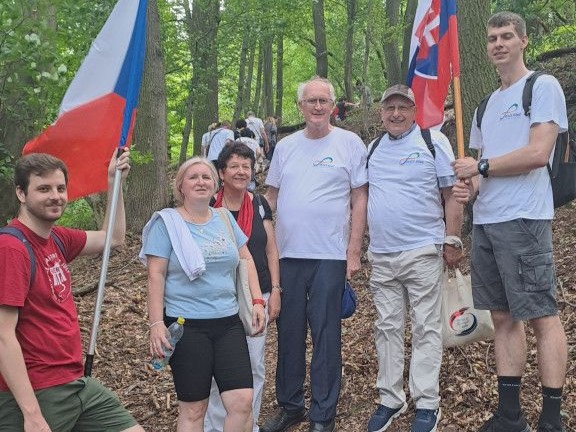Czech Peace Road: Christian Values Unite Slavic Peoples
- khwang562
- Jul 28, 2024
- 3 min read
Moravský Krumlov, Czech Republic – More than 100 people trekked to a beautiful historic town in the forested hills of South Moravia in the Czech Republic, to participate in Peace Road 2024 on July 28, 2024. The group, comprised of hikers not only from the Czech Republic, but also from Austria and Slovakia, gathered in front of the Saint Florian chapel on a hill overlooking the idyllic town of Moravský Krumlov.
The theme of this year's event was raising awareness of the need to revive Christian values in Central Europe. The spot where the participants gathered was approximately where Christianity came to the territory of today's Czech Republic and Slovakia more than one thousand years ago.
In his opening speech Dr. Juraj Lajda, president of UPF-Czech Republic, remarked that for the previous three years the Peace Road was organised as a joint project with Austria and Germany on the common border of the three countries, to demonstrate goodwill and unity. But the focus of this year’s project was the roots of Christianity.
“This is a very special place where in the 9th century Christianity came to the territory of today's Czech Republic and Slovakia,” Dr. Lajda pointed out. Christianity offers a path to overcome some of the worst features of human nature, he explained, such as hatred, arrogance and a lust for power, and points the way to reconcile and unite people and nations on the basis of humility, unity, love, and service to others.
Mrs. Suzana Strkulová, executive president of the Czech FFWPU, stressed the importance of unity and cooperation and noted that we stand at a crucial moment in history where the call for peace is louder than ever.
Mr. Miloš Klas, president of UPF-Slovakia, suggested that the traditional saying “divide and conquer” should be replaced by “unite and love.” The Czechs and Slovaks shared a common statehood for 75 years, followed by 33 years of division until this day. However, now again there is talk of unity. The Slavic people long for peace and freedom, he said.
Mr. Peter Haider, president of UPF-Austria, spoke about the relationship between East and West. After the fall of communism, he felt he should do something to foster unity among our nations, and he visited many Slavic nations. He said he could feel the deep soul of the Orthodox church, which connects the region’s peoples.
One of the goals of the Peace Road is to send a signal of support for the peaceful reunification of Korea. The presence of a young missionary, Ms. Yeon Hui Park, from South Korea enriched the meeting. She expressed the desire of Korean people for unification of the Korean peninsula and her gratitude that this three-nation Peace Road is trying to contribute to this unity.
“I am deeply moved to see so many people participating in the Peace Road for global peace and the reunification of North and South Korea,” she said.
The closing remarks from Dr. Dieter Schmidt, president of UPF-Central Europe, were read in his absence by Dr. Miloš Procházka. Dr. Schmidt emphasized the importance of the Peace Road and the work of UPF founders Rev. Sun Myung Moon and his wife Dr. Hak Ja Han Moon for the unification of Korea and the world. He said that Europe, known as the cradle of Christian values, has long been a beacon of hope for those seeking to overcome hatred, arrogance, and the desire for power. These values teach us to rise above our differences and work toward creating a society that is rooted in compassion and respect.
A musical performance and singing accompanied the program, which then continued in the city of Moravský Krumlov with a visit to a famous chateau, which houses the Slav Epic, the monumental work of painter Alfons Mucha. This work contains twenty large paintings depicting historical struggles, legends, and key events in Slavic and Christian history. The whole work is compact and captures well the spirit of the history of the Slavic nations. Earlier this year Dr. Hak Ja Han Moon had visited this gallery to view these immense works of art and honor the history of the Slavic people which they represent.



















